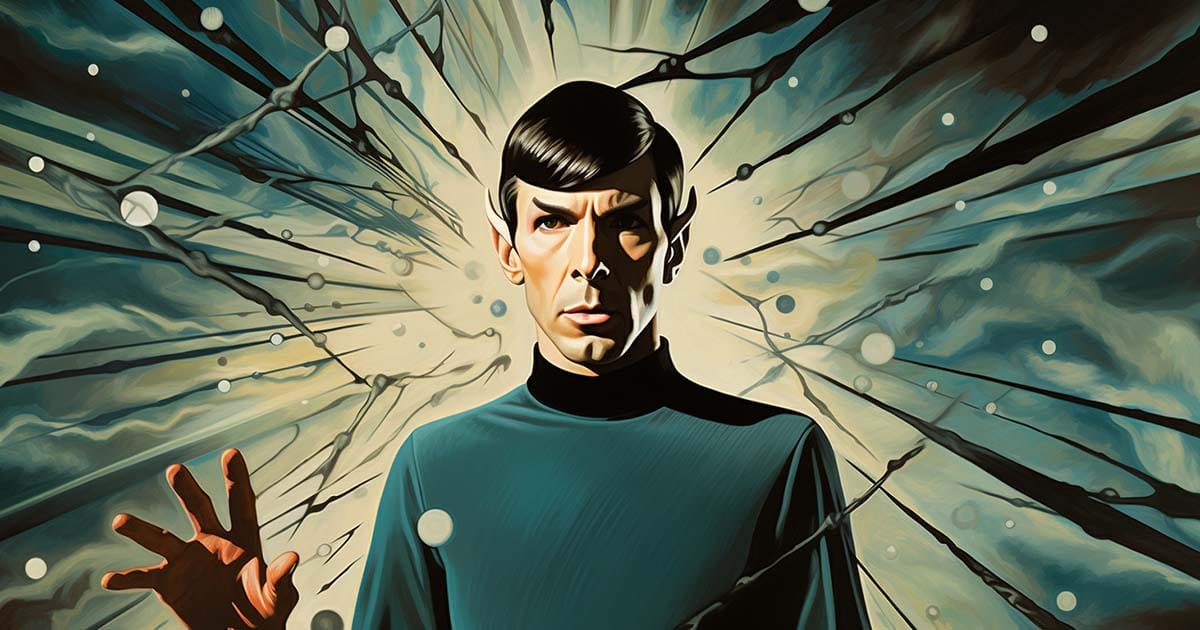Navigating Logic and Emotion in Star Trek TOS
Explore Spock's journey in "Star Trek: TOS" - a blend of logic and emotion, reflecting humanity's complexities. Dive into his evolution and cultural impact.

In science fiction, few characters have captured the imagination and admiration of audiences quite like Spock —the Vulcan-Human First Officer of the USS Enterprise in "Star Trek: The Original Series."
His journey throughout the series is a tapestry of emotional restraint and logical thinking, punctuated by moments of profound growth and understanding of the human condition.
Spock's character embodies the intersection between logic and emotion, a theme central to "Star Trek."
As a Vulcan, he adheres to a philosophy of logic and suppresses his emotions. This trait often puts him at odds with the more emotionally driven human crew members, particularly Dr. McCoy. This dichotomy is not just a source of conflict but also a vehicle for exploring deep philosophical questions about what it means to be human.
A Piece of The Action
One of the most insightful episodes regarding Spock's character evolution is "A Piece of The Action," where the Enterprise crew encounters life on Sigma Iotia II. This planet has modeled its society after a book about 1920s Chicago mobsters that the crew of an earlier Federation ship, the Horizon, had accidentally left behind.
The Iotians have transformed their world into a caricature of gangster-era Chicago, complete with mob bosses and a society ruled by fear and power struggles.
In this episode, Spock's logical mind is both an asset and a source of comic relief. His interactions with the Iotians and their gangster lifestyle highlight his alien nature and attempts to understand and navigate a society deeply rooted in emotion.
The episode also highlights Spock's ability to adapt and learn. He plays along with Kirk's bluff to control the planet's gangs, showing a capacity to engage in deception when necessary, albeit uncomfortably. This behavior is a departure from his usual straightforward approach and demonstrates his ability to grow beyond the rigid confines of Vulcan logic.
Spock's journey in TOS is one of gradual acceptance of his human side. Episodes like "A Piece of The Action" show that while he may never fully embrace emotion the way humans do, he learns to appreciate and, in some cases, utilize the human perspective. His character evolution is subtle but significant, moving from a purely logical being to someone who recognizes the value of balancing logic with the complexities of emotion.
Next, let's consider the character more generally.
Early Portrayal and Cultural Impact
In the early episodes, Spock was portrayed primarily as a figure of pure logic, often at odds with his more emotional human crewmates —as mentioned above.
This conflict was a theme that resonated deeply with audiences during the 1960s, a time of great social and political upheaval.
Spock's mixed heritage (his father was Vulcan and his mother human) allowed the show to explore issues of identity and belonging. This exploration was particularly impactful when many viewers were grappling with similar issues related to race and culture.
Spock's struggle to reconcile his Vulcan and human sides mirrored the experiences of many who felt caught between different cultural identities.
Character Development and Philosophical Exploration
As the series progressed, viewers saw Spock's character develop relatively more depth.
He began to explore and, at times, embrace his human side. This evolution was not just a journey of self-discovery for Spock but also served as a philosophical exploration for the audience. It raised questions about the nature of emotion and logic, and their roles in our lives.
One pivotal episode that exemplifies this is "The Galileo Seven," where Spock's logical approach to command is challenged by the fear and panic of his crew. This episode underscores the limitations of logic without empathy, a lesson Spock takes to heart.
Influence on Science and Society
Spock's character also had a significant influence on public interest in science and technology.
His logical approach to problem-solving and his use of advanced technology inspired many viewers to pursue careers in science, technology, engineering, and mathematics (STEM) fields. This impact is a testament to the power of science fiction to inspire real-world change.
Enduring Legacy
The legacy of Spock's character extends far beyond the original series. He became a cultural icon, representing a rational, peaceful approach to the problems of the world.
His famous Vulcan salute and phrase "Live long and prosper" became symbols of hope and unity for fans around the world.
Spock's evolution from a purely logical being to one who understands and appreciates the value of emotion reflects a journey that is deeply human.
Through Spock, "Star Trek: The Original Series" offered viewers a way to think about their own humanity, to question, to explore, and to grow. This is perhaps why, even decades later, Mr. Spock remains one of the most beloved and enduring characters in the "Star Trek" universe.


